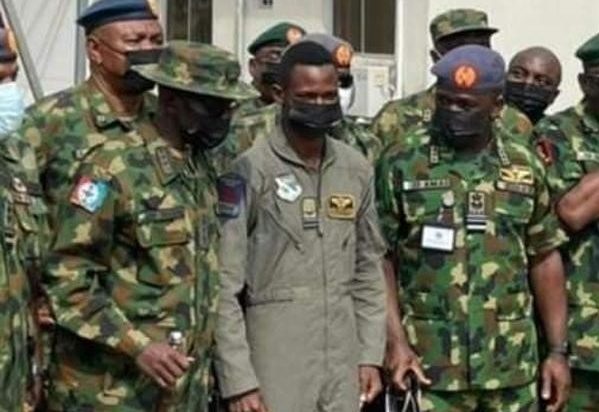Headlines
Terrorists, not bandits, shot down military jet – Lawmaker

Chairman, House of Representatives committee on Army, Hon Abdulrazak Namdas, has described the attackers of Nigerian Air Force fighter jet in Zamfara State as terrorists and not bandits.
Namdas who spoke in Abuja at a capacity building workshop on conflict reporting for journalists organised by Konrad Adenauer Stiftung (KAS) and Premium Times Centre for investigative journalism (Ptcij), said the media must identify criminals properly, considering the sophisticated weapons used to carry out the terrorist act.
He noted that the security situation in the country was deteriorating by the day, and which called for decisive action against the activities of criminal elements. He expressed concern that the enemies might be winning.
“We should be able to define who is actually a terrorist or cattle rustler because those who are called bandits have moved one step forward because of the kind of weapon they use. If a bandit can go to the extent of bringing down a fighter jet, it is no longer banditry but terrorism.
“The media should help to unravel the identity of these people, this is more than banditry, and calling them the right name would help us to tackle them. If I don’t have the knowledge of who these people are, it means even in terms of resource allocation, there is no way we can allocate resources,” he said.
The Head, European and International Cooperation of Konrad Adenauer Tiftung (KAS), Dr. Vladimir Kreck said with the level of insecurity in the northwest, north east, south east and south west, it was important for journalists to report these conflicts.
READ: Pilot ejects as military jet comes under fire
“Those that shot down the military plane should not be called bandits anymore because of the kind of work they do. You can’t call armed robbers bandits. Terrorist could be a proper name for them,” he said.
One of the lecturers at the seminar, Prof. Isaac Albert from University of Ibadan frowned at information gap often exercised by regimes’ spokespersons, saying this sometimes triggered conflict in the country.
Speaking on “Conflicts roots, causes and triggers, Prof. Albert described media coverage as an inherent part of a terrorist group’s communication strategy aimed at fulfilling targeted goals.
“Part of these goals is to capture attention, disseminate their messages in order to attract public’s sympathy for their cause and spread fear and terror among the population. This intimidation of the public is expected to result in increasing public pressure on decision makers to affect policy in ways that favour the terrorist organization’s interests.”
Publisher of Premium Times, Dapo Olorunyomi, stated that a journalist’s first obligation is to report the truth and their loyalty is to the people and not the government or their spokespersons.
“Nigeria’s treaty obligation is to respect the rights that enables journalists perform their duties in the most ethical manner without interference; besides, it is also an obligation for the government to protect journalists in the safest possible way to discharge their duties,” he stressed.










